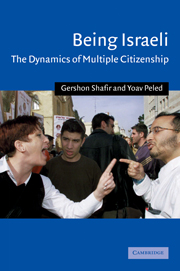Book contents
- Frontmatter
- Contents
- Acknowledgements
- List of abbreviations
- 1 Introduction
- Part 1 Fragmented citizenship in a colonial frontier society
- Part 2 The frontier reopens
- 6 New day on the frontier
- 7 The frontier erupts: the intifadas
- Part 3 The emergence of civil society
- Bibliography
- Index
- Cambridge Middle East Studies 16
6 - New day on the frontier
Published online by Cambridge University Press: 05 June 2012
- Frontmatter
- Contents
- Acknowledgements
- List of abbreviations
- 1 Introduction
- Part 1 Fragmented citizenship in a colonial frontier society
- Part 2 The frontier reopens
- 6 New day on the frontier
- 7 The frontier erupts: the intifadas
- Part 3 The emergence of civil society
- Bibliography
- Index
- Cambridge Middle East Studies 16
Summary
The major barricade in [Eretz Yisrael today] is the one that divides Jews from Israelis. The Jews are those who want to live, to one degree or another, in accordance with the Bible. The Israelis pay lip service, maybe, to the heritage, but in essence they aspire to be a completely new people here, a satellite of Western culture … I think that the positions of Gush Emunim really do constitute an irritating and alarming threat to the legitimacy of this secular, hedonistic, “Israelism.” The existence of Gush Emunim disturbs your experience of modern Western existence, including permissiveness and pacifism and internationalism.
(Yisrael Harel, a leader of Gush Emunim, to novelist Amos Oz: Oz 1984: 115–16)The 1967 war was followed by a process of colonization, first halting, then swift, in the occupied territories (OT). Its purpose, as before 1948, was to establish a permanent presence in the designated areas, alter their demographic constitution, and eventually annex them to Israel. But the location, significance, and justification of colonization, as well as the citizenship discourse used to legitimate it and the rights granted the settlers, show clear though partial signs of Israel's burgeoning transformation. For the first time, the republican discourse encountered serious competition in the sphere of colonization, its home turf so to speak. This took the form, first, of a religiously redefined nationalist discourse and, later on, of a liberal discourse as well.
- Type
- Chapter
- Information
- Being IsraeliThe Dynamics of Multiple Citizenship, pp. 159 - 183Publisher: Cambridge University PressPrint publication year: 2002



